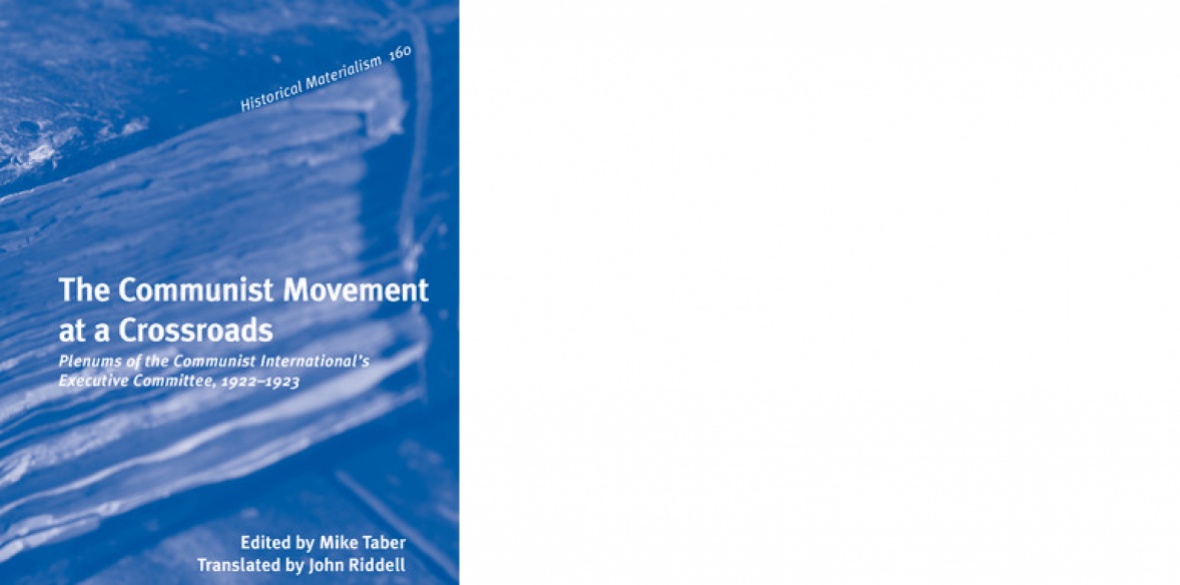This is the last article you can read this month
You can read more article this month
You can read more articles this month
Sorry your limit is up for this month
Reset on:
Please help support the Morning Star by subscribing here
The Communist Movement at a Crossroads: Plenums of the Communist International’s Executive Committee, 1922-1923
Edited by Mike Taber
(Brill, £194)
“UNITY is strength” has been a watchword of the broad labour movement from its very inception. But political organisations of the socialist and communist left have often failed to translate this into practice and this book documents a fascinating period in the history of the early Communist International when the strategy of the United Front took centre stage.
The period in question, 1922-23, represented an ebb in the post-1917 revolutionary tide and the partial stabilisation of capitalism after WWI. Yet it was also a period of sharp imperialist rivalry as the division of the spoils of war created friction between the British and French. The Ottoman Empire fell, leaving Paris and London to carve up its non-Turkish territory in the Middle East. A century later, we are still living through its impact in Palestine and Syria.
French troops marched into Germany’s Ruhr, the partition of Ireland resulted in a civil war in the Irish Free State between pro- and anti-Treaty forces and Egypt ceased to be a British protectorate but British troops still occupied the Suez Canal.
Against this backdrop, communists were urged to find common cause with other trends in the working-class movement which, in Europe at least, was still largely dominated by mass socialist or social democratic parties and in Britain by the peculiar beast of the Labour Party.
British readers will be particularly interested in the reports and discussions concerning the Communist Party of Great Britain and its relationship to the Labour Party, Independent Labour Party and the TUC. At this time the CPGB claimed a membership, probably inflated, of 7-8,000.
Communists were urged by the Comintern leadership to work for the return of a Labour government and to find common minimum demands to put before the Labour Party and TUC general council.
At the same time, the early CPGB was sharply reprimanded for failing to pay sufficient attention to the Empire’s key colonial questions, namely Ireland and India.
But there were also signs that the complexities of British society and political were not fully appreciated even by some of the giants of the early Comintern. Trotsky, for example, is quoted here as remarking: “There is no petty bourgeoisie in Britain; there is just the big bourgeoisie.” A crudely inaccurate comment that is sharply at odds with more perceptive insights in his other contributions.
The influence of Trotsky or, to be more specific, his interpretation of the post-Lenin Comintern, is also obvious in the book’s introduction by editor Mike Taber who, like translator John Riddell, is a former activist of the Socialist Workers Party, at one time the US section of the Fourth International.
Riddell has devoted most of his life to bringing the documents of the early Communist International to wider audiences, first working with Pathfinder Press, the publishing arm of the US SWP, and latterly with the Dutch academic press Brill and Haymarket Books, publisher of the US-based International Socialist Organisation. Thus this is the latest volume in what has been a titanic political achievement in research and translation.
Priced at an eye-watering £194, this is not a hardback that will easily find its way into the hands of the working-class activists and young militants the Comintern looked toward. While no fault can be attributed to the editor and translator for this, the rich heritage of the communist and socialist movements should not be left to the mercy of academic or corporate publishers. Thankfully a cheaper paperback edition is promised next year from Haymarket Books.
Since previous paperback editions in the same series are priced at around the £40-£50 mark, this will likely keep it out of reach of many who should benefit from this marvellous collection. Ask your local library, if you still have one, to order a copy instead.










